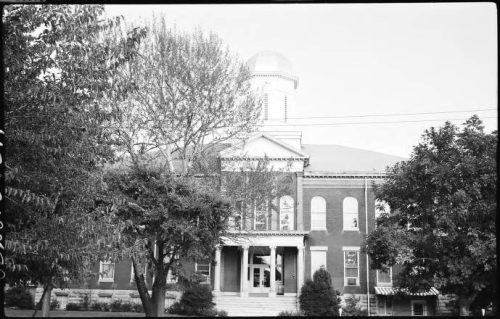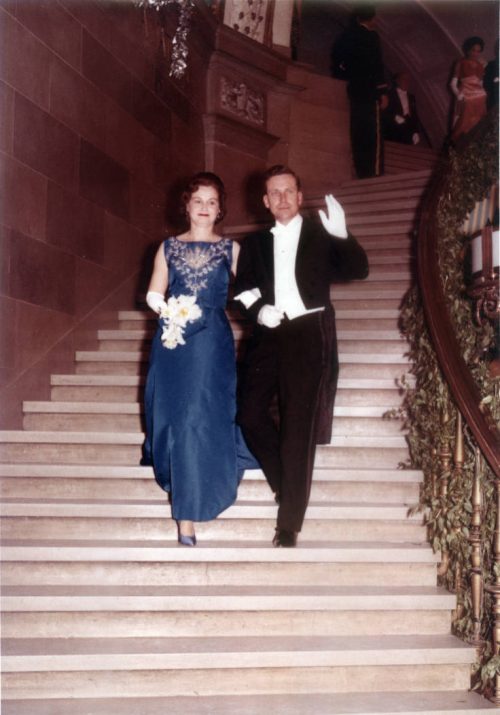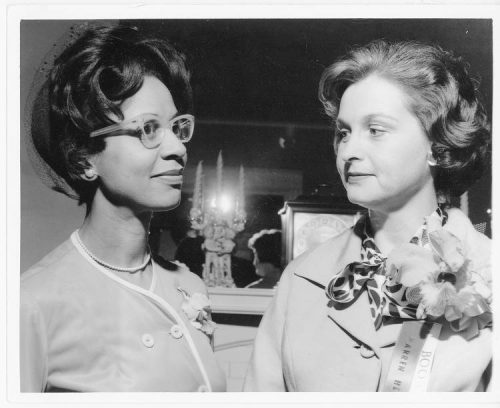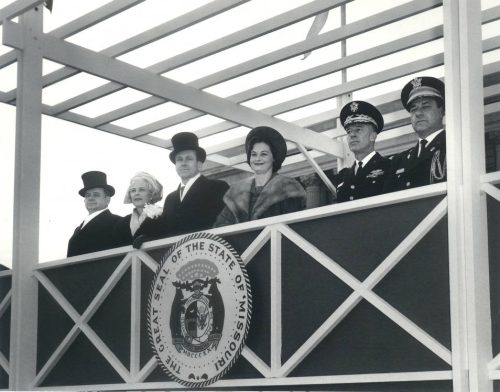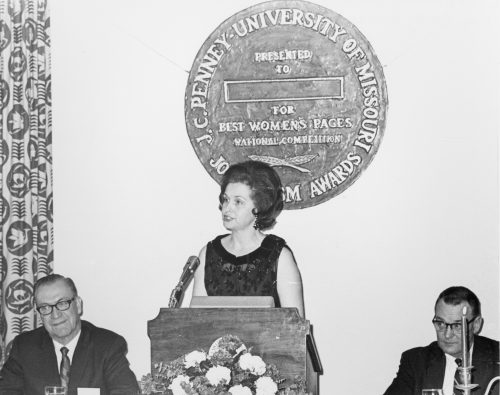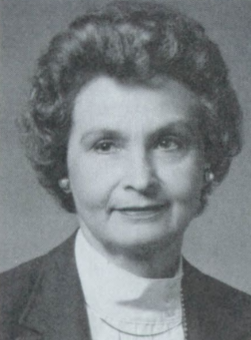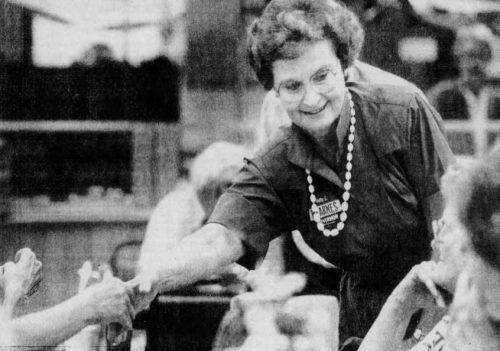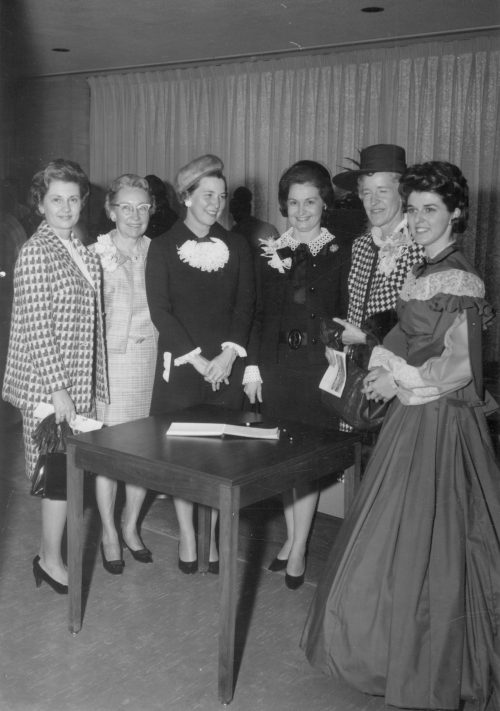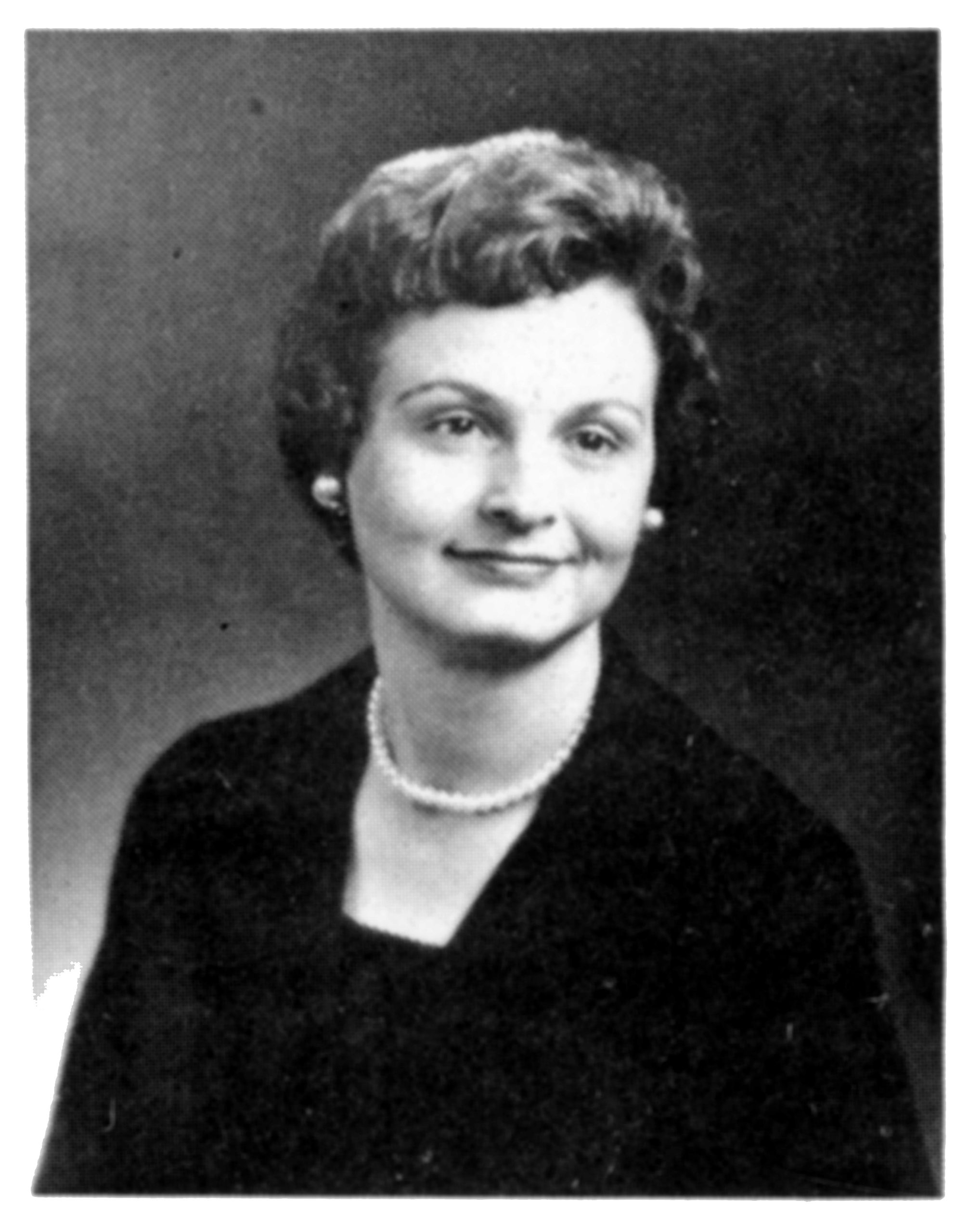
Betty Cooper Hearnes
Introduction
Betty Cooper Hearnes was an educator and legislator from Charleston, Missouri. Known to many as the state’s First Lady while her husband, Warren Hearnes, was Missouri’s governor from 1965 to 1973, she later served ten years in the Missouri House of Representatives (1979–1989). In the House, she was a strong advocate for education, prison reform, public safety, and the arts. In 1988 she became the first woman in Missouri history to run for governor on a major political party’s ticket.
Early Years
Betty Cooper Hearnes was born July 24, 1927, in Brinkley, Arkansas, to Allen Britten (A. B.) Cooper and May Lawrence Cooper. A. B. Cooper was a Baptist minister, and the family moved to Mississippi County, Missouri, in the early 1930s when he was chosen as minister of the First Baptist Church in Charleston. During Betty’s youth, both of her parents were active in establishing Baptist churches in Mississippi County. She remembered with pride that her father helped lead local Red Cross efforts during the disastrous Mississippi River flood of 1937.
Growing up in Charleston, she attended the local public school and graduated from Charleston High School. She then attended several colleges, including Southeast Missouri State College (now Southeast Missouri State University) in Cape Girardeau; Central College in Conway, Arkansas; and Baylor University in Waco, Texas.
Educator
In 1948, Betty Cooper had a chance meeting with fellow Charlestonian Warren Hearnes. Four years her senior, Warren Hearnes had been appointed to the US Military Academy in West Point, New York. After suffering an injury while stationed in Puerto Rico, Hearnes returned to Mississippi County, where he began dating Betty. They were married on July 2, 1948. In the following years they had three daughters, Lynn, Leigh, and Julie.
After they were married and Warren had healed from his injury, the Hearneses moved to Puerto Rico so that Warren could complete his military service. In Puerto Rico, Betty taught children at the US Army post. Upon returning to Missouri, Warren and Betty decided to continue their education at the University of Missouri. Warren completed a law degree, and Betty earned a bachelor’s degree in music education. Throughout her life, Betty spoke of the importance of education, which she knew from her experience as a teacher in Puerto Rico as well as in Charleston, East Prairie, and Sikeston, Missouri.
First Lady
In 1950, Warren Hearnes was elected to represent Mississippi County in the Missouri House of Representatives, where he served for ten years. While living in Mississippi County, Warren worked as an attorney and Betty taught in local schools. In 1960, Warren Hearnes was elected Missouri’s secretary of state. Four years later, in 1964, he ran for and was elected governor, and the Hearnes family moved into the governor’s mansion in Jefferson City.
As First Lady of Missouri, Betty Hearnes took on an active role in promoting several important causes in the state, including education, mental health, historic preservation, and the arts. She was a popular speaker on issues ranging from Missouri history to the importance of government. In the mid-1960s, she campaigned statewide for improved public funding for the Missouri Council for the Arts. The Missouri General Assembly ended up passing into law a bill, known as “Betty’s Bill,” that increased funding for the arts.
In addition to her efforts to provide more funding for the arts, she also felt that work was needed on the governor’s mansion. Built in 1871, the mansion had not received regular updates during its lifespan. Soon after moving into the building in 1965, the Hearneses took note of conditions such as worn-out carpeting, unlevel floors, and a leaky roof. In response, the legislature set aside state funds for upgrades, and Betty took the lead on ensuring that the stately house returned to its former glory, even performing some of the restoration work herself. Due to the number of repairs necessary, the project lasted beyond her time in the governor’s mansion.
The Representative from the 160th District
In 1979, Betty Hearnes ran for and won a seat in the 160th District of the Missouri House of Representatives. The district covered portions of Mississippi and Scott Counties in the Missouri Bootheel. Reelected four times, Hearnes served the 160th District from 1979 until 1989.
While serving in the House, Betty Hearnes took on several important roles. As the chairwoman of the Correctional Institutions and Problems Committee, she called for yearly reviews of prisons and other correctional institutions, updating and building new facilities, and expanding training programs for correctional officers. She also served on the Education Committee and the Appropriations Committee, which made decisions about how to spend state funds. She supported increased funding and updates to the curriculum for Missouri’s public schools. She also chaired the Missouri General Assembly’s Women’s Legislative Caucus, a gathering for women who had been elected to the legislature.
A Second Governor Hearnes?
In 1988, Betty Hearnes became the first woman in Missouri history to run for governor on a major political party ticket when she won the Democratic primary. In the general election, she faced off against John Ashcroft, a Republican who had been the governor for four years and was running for a second term. Interviewed later in life about her own campaign for governor versus her husband’s campaigns in the 1960s, Betty pointed out how politics had changed, particularly when it came to the use of television advertisements. She noted that “the day is over when you can [just] shake hands.” Ultimately, Ashcroft was reelected governor.
Following her defeat, Hearnes tried two more times to win election to public office. In 1990, she lost a bid to reclaim her old seat in the 160th District of the Missouri House of Representatives. Two years later, she lost to Peter Kinder, who later served as Missouri’s lieutenant governor, when she ran for the 27th District in the Missouri Senate.
Legacy
After her years of public service, Betty Hearnes lived for the rest of her life in Charleston, Missouri. When not directing the choir of the Charleston First Baptist Church, she could be found at the Hearnes Museum, a small facility honoring her family’s legacy of public service. Over the course of her life, Betty received many awards, including honorary degrees from colleges and universities, Charleston Woman of the Year, and Distinguished Woman in America from Columbia College. She was inducted into the Academy of Missouri Squires, an organization honoring Missourians who have made significant contributions at the local, state, and national levels. Betty Cooper Hearnes passed away on December 14, 2023.
Betty Hearnes’s legacy lives on in not only the legislation she championed but also the institutions to which she held close ties. At Southeast Missouri State University, a music scholarship was established in her name. At the University of Missouri in Columbia, several pieces of her wardrobe, including campaign suits, dresses, and gowns, from her time as First Lady are preserved in the Betty Sue Cooper Hearnes Collection as part of the Missouri Historic Costume and Textile Collection.
Text and research by Amy C. Nickless and Sean Rost
References and Resources
For more information about Betty Cooper Hearnes’s life and career, see the following resources:
Society Resources
The following is a selected list of books, articles, and manuscripts about Betty Cooper Hearnes in the research centers of The State Historical Society of Missouri. The Society’s call numbers follow the citations in brackets.
Articles from the Newspaper Collection
- “Betty Hearnes Wins House Seat.” Poplar Bluff Daily American Republic. February 28, 1979. p. 2.
- “Cooper-Hearnes.” Charleston Democrat. July 8, 1948. p. 1.
- Ganey, Terry, and Tom Uhlenbrock. “Governor Gets 65% Of Vote.” St. Louis Post-Dispatch. November 9, 1988. p. 1.
- “Missouri Festival of the Arts Is Planned, Mrs. Hearnes Says.” St. Louis Post-Dispatch. June 19, 1965. p. 5A.
- Suntrip, Jack. “Betty Hearnes: Former Mo. First Lady Ran for Governor in 1988.” St. Louis Post-Dispatch. December 16, 2023. p. A6.
- “Warren Hearnes Museum Open House.” Charleston Enterprise-Courier. November 30, 1989. p. 14.
- Ahrens, Steven N., ed. Official Manual, State of Missouri, 1985–1986. [REF M353.9 M691o]
- Ahrens, Steven N., ed. Official Manual, State of Missouri, 1987–1988. [REF M353.9 M691o]
- Ahrens, Steven N., ed. Official Manual, State of Missouri, 1989–1990. [REF M353.9 M691o]
- Ahrens, Steven N., ed. Official Manual, State of Missouri, 1991–1992. [REF M353.9 M691o]
- Ahrens, Steven N., ed. Official Manual, State of Missouri, 1993–1994. [REF M353.9 M691o]
- Carnahan, Jean. If Walls Could Talk: The Story of Missouri’s First Families. Jefferson City, MO: MMPI, 1998. [REF F508 C214]
- Crouse, Rob. Warren Eastman Hearnes: A Memoir, from the Personal Notes and Recollections of Betty C. Hearnes. Marceline, MO: Walsworth Publishing, 2007. [REF F508.1 H3513]
- Johnson, Kenneth M., ed. Official Manual, State of Missouri, 1979–1980. [REF M353.9 M691o]
- Johnson, Kenneth M., ed. Official Manual, State of Missouri, 1981–1982. [REF M353.9 M691o]
- Johnson, Kenneth M., ed. Official Manual, State of Missouri, 1983–1984. [REF M353.9 M691o]
- Allen Britten Cooper Papers (CG0033)
This collection contains 527 sermon outline notes of Rev. Allen Britten Cooper from Charleston, Missouri, from 1934 to 1955. It also includes the published manuscript of the sermons by May Lawrence Cooper at an unknown time. - Betty Cooper Hearnes, Speech, 1971 (C3274)
This collection contains an address at the dedication of the new bandstand in Fayette, Missouri, at Central Methodist College. - Missouri Commission on the Status of Women Papers (C3903)
Papers and related materials of the Missouri Commission on the Status of Women. The papers include minutes of meetings, meeting agendas, correspondence, annual reports, press releases, newspaper clippings, photographs, federal publications, and miscellaneous material. - Missouri Governor’s Mansion Tour (C4242)
This collection includes a color film, produced by Southwestern Bell in 1970, showcasing the Missouri Governor’s Mansion and featuring Betty Cooper Hearnes. - Politics in Missouri Oral History Project (C3929)
This oral history project consists of interviews with Missouri legislators, politicians, aides, and other participants in Missouri politics. The records include audio cassettes, compact discs, and transcripts of the interviews. The collection contains an interview with Betty Cooper Hearnes, two interviews with Warren E. Hearnes, and an interview with Jane Cooper Stacy. - University of Missouri, Admission of Women Centennial Records (C2603)
The University of Missouri, Admission of Women Centennial Records contains correspondence and lists used in preparations for commemorative activities on the centennial of the admission of women to the University. - Warren E. Hearnes Papers, 1950–1972 (C3522)
This collection features materials determined by Warren Hearnes to be his personal papers while Missouri’s governor from 1965 to 1973. The bulk of the collection is correspondence regarding campaigns, legislation, and the Democratic Party. - Warren E. Hearnes Papers, 1965–1972 (C3585)
This collection is on microfilm and contains Hearnes’s official papers while governor. The originals are held by the Missouri State Archives in Jefferson City.
Outside Resources
These links will take you outside the Society’s website. The Society is not responsible for the content of the following websites:
- Betty Sue Cooper Hearnes Collection
This website is hosted by the University of Missouri–Columbia and features information about, and images of, the materials housed in the Betty Sue Cooper Hearnes Collection of the Missouri Historic Costume and Textile Collection. - Hearnes Museum
This website is hosted by the Missouri Division of Tourism and features information about the Hearnes Museum in Charleston, Missouri. - Friends of the Missouri Governor’s Mansion
This website is hosted by the Friends of the Missouri Governor’s Mansion and features a short biography of Betty Cooper Hearnes.

